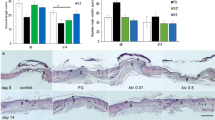Abstract
Hinman and Maibach have shown that in human skin wounds, as in pig's skin, epidermal regeneration is faster when the wound surface is moist than when exposed to the air and dry. There is little doubt that this is due to the way the scab is formed on an exposed wound surface.
This is a preview of subscription content, access via your institution
Access options
Subscribe to this journal
Receive 51 print issues and online access
$199.00 per year
only $3.90 per issue
Buy this article
- Purchase on Springer Link
- Instant access to full article PDF
Prices may be subject to local taxes which are calculated during checkout
Similar content being viewed by others
References
Braun, A. A., and Magazanik, G. L., Vopr. Kurort., 4, 349 (1959).
James, D. W., J. Path. Bact., 69, 33 (1955).
Zahir, M., J. Path. Bact., 84, 79 (1962).
Devenyi, I., and Holczinger, L., Acta Morph. Acad. Sci. Hung., 4, 447 (1954).
Hadfield, G., Brit. J. Surg., 50, 649 (1963).
Winter, G. D., Advances in Biology of Skin, 5, Wound Healing (in the press).
Forage, A. V., Lancet, ii, 690 (1962).
Needham, A. E., Regeneration and Wound Healing (Methuen, London, 1952).
Author information
Authors and Affiliations
Rights and permissions
About this article
Cite this article
WINTER, G. Effect of Air Exposure and Occlusion on Experimental Human Skin Wounds. Nature 200, 378–379 (1963). https://doi.org/10.1038/200378a0
Issue Date:
DOI: https://doi.org/10.1038/200378a0
This article is cited by
-
Management of soft tissues in patients with periprosthetic joint infection
Arthroplasty (2023)
-
Advanced polymer hydrogels that promote diabetic ulcer healing: mechanisms, classifications, and medical applications
Biomaterials Research (2023)
-
Recent trends on biomaterials for tissue regeneration applications: review
Journal of Materials Science (2023)
-
Waste to high-value products: The performance and potential of carboxymethylcellulose hydrogels via the circular economy
Cellulose (2023)
-
Auranofin Rapidly Eradicates Methicillin-resistant Staphylococcus aureus (MRSA) in an Infected Pressure Ulcer Mouse Model
Scientific Reports (2020)
Comments
By submitting a comment you agree to abide by our Terms and Community Guidelines. If you find something abusive or that does not comply with our terms or guidelines please flag it as inappropriate.



